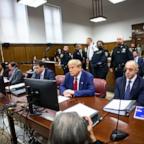Bad sign: CEOs aren't buying stock in their companies
— -- It's not just regular investors who lack the guts to step up and buy stocks. Companies' CEOs do, too.
Other than a few high-profile exceptions, including the heads of JPMorgan Chase and Bank of America, officers of U.S. companies aren't exactly lining up to buy their companies' shares. The dearth of so-called insider buying, despite a nearly 40% fall in stock values in the past year, is a potentially troubling development. CEOs arguably know more about their companies' future than anyone.
Because CEOs typically buy when their stock has fallen and is about to recover, the fact they're not heavily buying now is "a little disturbing," says Darren Roulstone, a professor of accounting at Ohio State University.
The buying of stock by company officers and directors remains modest relative to selling, according to Thomson Reuters. Over the past 90 days, insiders at U.S. companies have bought just $670.2 million in stock, while they sold $2.8 billion.
A few of the reasons CEOs and other officers may not be stepping up and buying include:
•Personal cash crunches. Some executives may not have the cash available to plow into company shares, says Leland Bettis at market research firm Gradient Analytics. Some CEOs face tax bills on shares they received as compensation.
In fact, executives are looking to reduce their risk, not increase it. There's been an increase in the number of executives entering so-called forward sales contracts, Bettis says. These contracts help executives protect themselves financially from the risk of falling stock values by locking in a sale price now for shares they plan to sell in the future.
•Greater uncertainty about the economy. Executives have an advantage when it comes to knowing how their companies are doing, says Terrance Odean of the University of California-Berkeley. But they don't have special insight into the economy, which continues to play a large role in the direction of stock prices. "Executives don't have insider information about the economy. That's a big question mark," he says.




